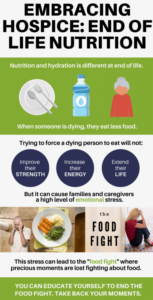Many physical changes take place to patients at the end of their life, one of the most noticeable is the lack of nutrition the patient requires. When someone is in the process of dying, he/she does not consume food or drink how he/she used to, or even at all. This is completely natural. Sometimes nothing sounds or tastes good, and sometimes the patient has cravings for certain foods. This is often one of the hardest symptoms for caregivers to accept since food is how we nourish the body and spend time with loved ones.
As the body slows down, it can no longer digest and process food the same way as it used to. Expect your loved one to lose weight as this happens. This does not mean the patient is hungry or being “starved” as they refuse nutrition.

Don’t waste your precious moments fighting with your loved one about food and drink; spend those precious moments with him/her! Let the patient guide you on their wishes. He/she will let you know when he/she is hungry or thirsty and if anything specific sounds good. Liquids are often preferred to solids. Sometimes these liquids need to be thickened to prevent aspiration. Small ice chips or frozen fruit juice or cut up popsicles may be refreshing! If the patient is able to swallow, small amounts of fluids given via syringe (without the needle) may be useful.
Sometimes the taste or smell of a familiar food, in small amounts, is comforting. If the patient loved pizza from a specific place, order it! If the patient wishes to have a bite, they may say so. If not, the smell alone will comfort them.
If the patient does not wish to eat, they will tell you if they can still speak. If the patient is no longer able to speak, they may cough, bite the utensil, clamp their mouth closed, turn their head away, or spit the food out to let you know they do not want to eat. Respect your loved one’s wishes and don’t force them to eat or drink. Forcing food and drink to them is not going to prolong their life; it will just cause unnecessary arguments and take away minutes or hours from time you would otherwise enjoy! Also, a patient may appear thirsty when close to death but they are unable to drink. In this situation, you will want to provide oral care to keep the mouth dampened and clean. Remember to shower your loved one with love and respect their wishes and enjoy your time with them.
If you have any questions about end of life care or know someone who might benefit from hospice services, please call St. Anthony’s Hospice at (270) 826-2326 or make an online referral.
